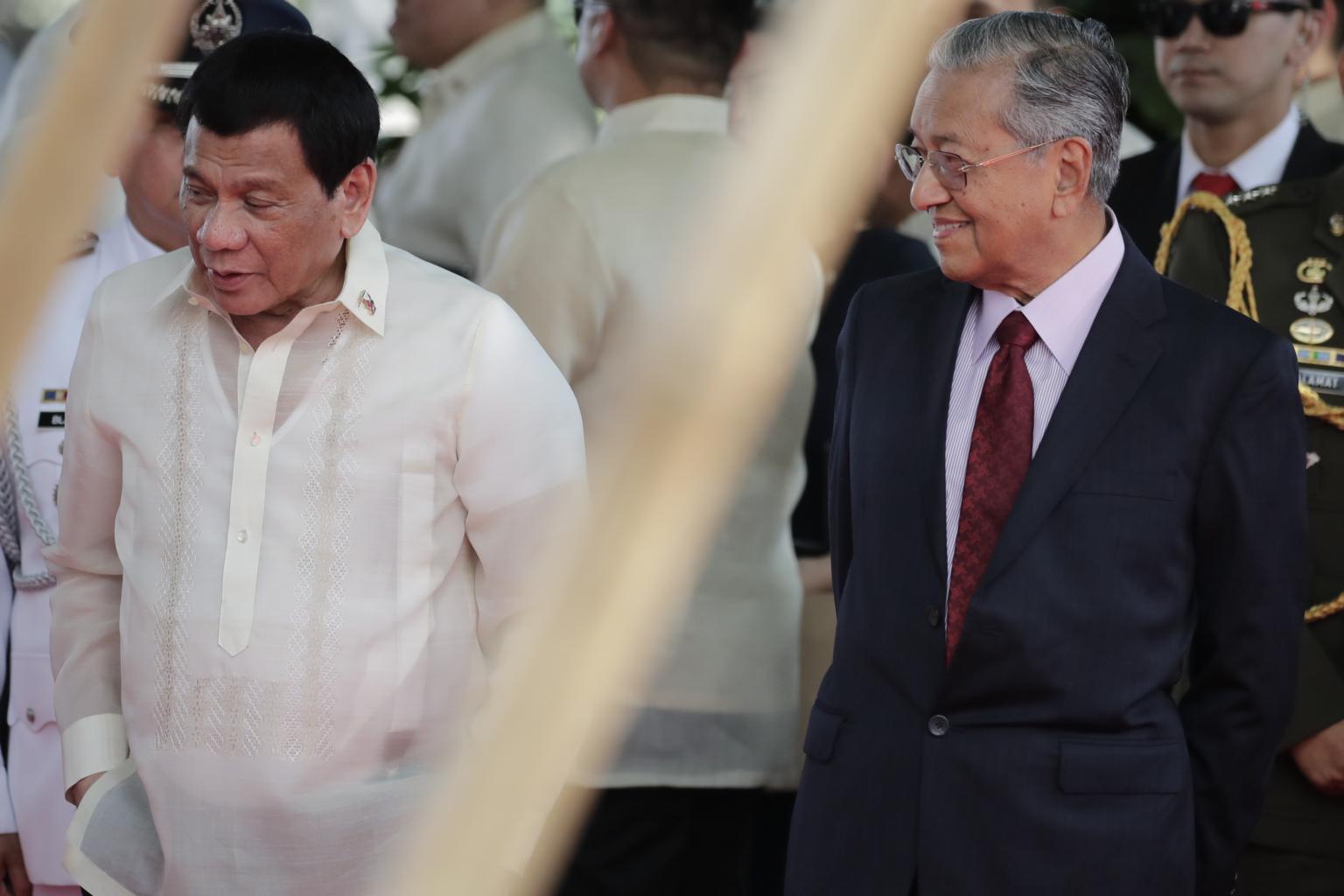Beware of China 'debt trap', Malaysia's Mahathir tells the Philippines
Sign up now: Get insights on the biggest stories in Malaysia

Philippine President Rodrigo Duterte (left) and Malaysia Prime Minister Mahathir Mohamad (right) walk past a crowd during a welcome ceremony at the Malacanang Presidential Palace in Manila, Philippines, on March 7, 2019.
PHOTO: EPA-EFE
MANILA - Malaysian Prime Minister Mahathir Mohamad cautioned the Philippines on Thursday (March 7) over falling into a "debt trap", as the country banks on China to bolster growth.
"If you borrow huge sums of money from China, and then you cannot pay, when the person is a borrower he is under the control of the lender. So, we have to be very careful about that," Tun Mahathir told ABS-CBN News.
He said countries like the Philippines should "regulate or limit influences from China".
Since coming into power last year, Dr Mahathir has repeatedly vowed to renegotiate or cancel what he calls "unfair" Chinese infrastructure deals authorised by his predecessor Najib Razak, whose near-decade long rule ended in electoral defeat amid a massive financial scandal.
The Mahathir administration is still re-negotiating the US$20 billion (S$27.14 billion) East Coast Rail Link project with China to push the cost down, nearly 10 months after his Pakatan Harapan alliance took over the Malaysian federal government.
Before that, in August last year, the Malaysian government cancelled another China-backed project, a natural gas pipeline in the East Malaysia state of Sabah.
Taking a different course, Philippine President Rodrigo Duterte has been courting investors in China to help fund his US$108 billion programme to build new highways, railways, airports, piers and bridges in the next 10 years.
Critics have warned that this pivot to China could lead to a "debt trap".
They cited the experience of Sri Lanka. China lent Sri Lanka funds to have its ports upgraded by Chinese construction companies.
When Sri Lanka could not pay back the loans, China turned them into equity, giving it ownership and control of Sri Lanka's two major ports.
Philippine Finance Secretary Carlos Dominguez said this was unlikely to happen in the Philippines.
He said Chinese loans would account for just 4.5 per cent of the country's total debts by the time Mr Duterte steps down in 2022.
He said Mr Duterte's ambitious infrastructure push would be funded mostly via new taxes and loans with "the lowest possible interests rates and the longest possible term arrangements".
Dr Mahathir also warned the Philippines against letting in a huge number of Chinese workers that could "disturb the political equations".
"We have a proper definition of what constitutes foreign direct investments. It is all about bringing in capital, technology, employing our people and improving contributions to the economy. But foreign direct investments should not involve bringing huge numbers of foreigners to live in the country because that might disturb the political equations in the country," he said.
At least 200,000 Chinese have flocked to Manila since Mr Duterte's 2016 election, many of them employed by online gaming firms that cater to Chinese players.
"So long as they are not going to be permanent residents, it is not a danger to the Philippines," Dr Mahathir said. "But if huge numbers of any foreigners come to live and stay in the country or even to influence economy, then you have to do some rethinking, whether it is good or bad or the limits that we have to impose on them."
Mr Duterte has warmly embraced China despite his nation's longstanding maritime row with Beijing over the South China Sea.
China asserts sovereignty over almost all of the resource-rich sea, with competing claims from the Philippines, Malaysia, Brunei, Taiwan and Vietnam.
Commenting on the sea dispute, Dr Mahathir said there should be no impediment to vessels using the strategic waterway, through which trillions of dollars in global trade pass through each year.
"The most important thing is that the South China Sea in particular must be open to navigation," he said.


